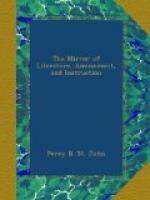“Est illis strigibus nomen:
sed nominis hujus
Causa, quod horrenda stridere nocte Solent."[4]
The barn owl may be heard shrieking here perpetually on the portico, and in the large sycamore trees near the house. It shrieks equally when the moon shines and when the night is rough and cloudy; and he who takes an interest in it may here see the barn owl the night through when there is a moon; and he may hear it shriek when perching on the trees, or when it is on wing. He may see it and hear it shriek, within a few yards of him, long before dark; and again, often after daybreak, before it takes its final departure to its wonted resting place. I am amply repaid for the pains I have taken to protect and encourage the barn owl; it pays me a hundred-fold by the enormous quantity of mice which it destroys throughout the year. The servants now no longer wish to persecute it. Often, on a fine summer’s evening, with delight I see the villagers loitering under the sycamore trees longer than they would otherwise do, to have a peep at the barn owl, as it leaves the ivy-mantled tower: fortunate for it, if, in lieu of exposing itself to danger, by mixing with the world at large, it only knew the advantage of passing its nights at home; for here
“No birds that haunt my valley free
To slaughter I condemn;
Taught by the Power that pities me,
I learn to pity them.”
Magazine of Natural History.
[1] “He snatched lightning
from heaven, and the sceptre from
tyrants.”
[2] “Thou canst lead kings and their silly nobles.”
[3] “One out of many.”
[4] “They are called
owls (striges) because they are accustomed
to screech (stridere) by night.”
* * * * *




